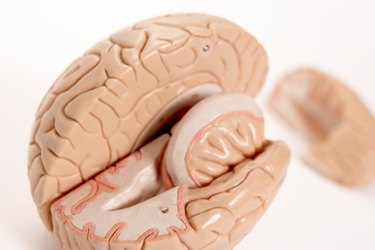
Emotions, like fear and love, are carried out by the limbic system, which is located in the temporal lobe. While the limbic system is made up of multiple parts of the brain, the center of emotional processing is the amygdala, which receives input from other brain functions, like memory and attention.
Amygdala
Video of the Day
Shaped like an almond, the amygdala is responsible for multiple emotional responses, like love, fear, anger and sexual desire. Shippensburg University states that in animal studies, stimulation or removal of the amygdala alters the emotional response: electrical activation causes aggression, while surgical removal results in indifferent emotional reactions. Therefore, damage to the amygdala can result in abnormal emotional responses, and overstimulation causes excessive reactions.
Video of the Day
Hippocampus
The hippocampus is another part of the limbic system that sends information to the amygdala. One of the memory processing centers of the brain, the hippocampus interacts with the amygdala when a person has memories with emotional ties. The Canadian Institutes of Health Research adds that the connection between the hippocampus and amygdala "may be the origin of strong emotions triggered by particular memories," which explains emotional responses to traumatic memories.
Prefrontal Cortex
The prefrontal cortex, located near the front of the head, is involved in decision making in response to emotions. The Canadian Institutes of Health Research states that the prefrontal cortex controls what decision a person makes when faced with an emotional reaction, and also regulates anxiety.
Hypothalamus
The hypothalamus, also a part of the limbic system, feeds information into the amygdala. Shippensburg University states that the hypothalamus acts as a regulator of emotion, controlling levels of sexual desire, pleasure, aggression and anger.
Cingulate Gyrus
The cingulate gyrus acts as a pathway between the thalamus and the hippocampus, and plays a role in remembering emotional charged events. Shippensburg University notes that the cingulate gyrus focuses the attention on the event, alerting the rest of the brain that it is emotionally significant.
Ventral Tegmental Area
The ventral tegmental area is also involved in emotions and love, particularly in how a person perceives pleasure. Dopamine pathways are located in the ventral tegmental area: dopamine is a neurotransmitter involved in mood, and increased levels elevate the person's level of pleasure.
Is this an emergency? If you are experiencing serious medical symptoms, please see the National Library of Medicine’s list of signs you need emergency medical attention or call 911.